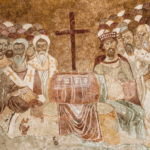In the wake of new defections from the Christian faith by prominent writers and leaders, here are seven things to remember and do:
1. We shouldn’t be surprised.
In Matthew 24, when his disciples ask him about the signs of the end of the age, Jesus speaks of an increase in lawlessness that will cause “the love of many will grow cold.” (v12) But, of course, the pattern of Jesus’ own ministry bears out the same pattern. The same crowds that flocked to him ultimately turned away—and finally turned on him.
Paul speaks similarly of the last days as “times of difficulty” when people will be “treacherous, reckless, swollen with conceit, lovers of pleasure rather than lovers of God … when people will not endure sound teaching, but having itching ears they will accumulate for themselves teachers to suit their own passions.” (2Tim 3:4; 4:3)
We are living in the last days and these things will happen. We shouldn’t be surprised.
We are living in the last days and these things will happen. We shouldn’t be surprised.
2. We shouldn’t be discouraged
Nor should we be discouraged. Jesus’ next statement in Matthew 24 is the promise that those who endure will be saved (v13) and “this gospel of the kingdom will be proclaimed throughout the whole world as a testimony to all nations, and then the end will come.” (v14).
Paul’s advice to Timothy is for him simply to “preach the word … be sober-minded, endure suffering, do the work of an evangelist, fulfil your ministry.” (4:2,5)
The pattern and response is a bit like what they taught me about the housing sector when I was studying architecture: sometimes it surges, sometimes it slumps but the overall trajectory is steady growth. Don’t panic. Keep the big picture in mind. Invest! (I didn’t).
But God’s growth-plan is infinitely more certain and worthy of investment:
Be patient, therefore, brothers, until the coming of the Lord. See how the farmer waits for the precious fruit of the earth, being patient about it, until it receives the early and the late rains. You also, be patient. Establish your hearts, for the coming of the Lord is at hand. (James 5:7-8)
3. We should be afraid
Of course, there are unhelpful forms of fear. There’s fatalistic fear that doesn’t understand the comfort of the gospel of grace. There is Catholic fear where we worry that we’ll trump God’s grace with a mortal sin and end up in hell. There is Puritan fear that so fixates on the signs of genuine faith in us that it turns away from its true object (Christ).
But there is also a proper fear that we might grow cold or drift away or be hardened by sin’s deceitfulness: that we might move on from Jesus.
This is the fear that the writer of Hebrews speaks about when he warns us not to forget the terrible alternative to trusting in Christ: “a fearful expectation of judgment, and a fury of fire … the sound of a trumpet and a voice whose words made the hearers beg that no further messages be spoken to them.” (Heb 10:27; 12:19). This is the fear that inspires Peter’s advice for us to pursue increasing godliness so that we will “never fall.” (2Peter 1:8-10). It’s the “fear and trembling” that Paul wants us to have lest gospel ministry should be in vain for us (Phil 2:12 c.f. 16).
Do we feel a deadness to the gospel? Are we more alive to other things? Then we should be afraid. We should go back to the cross; remember God’s promises; give him no rest until he refreshes us by his Spirit:
And I tell you, ask, and it will be given to you; seek, and you will find; knock, and it will be opened to you. For everyone who asks receives, and the one who seeks finds, and to the one who knocks it will be opened … If you then, who are evil, know how to give good gifts to your children, how much more will the heavenly Father give the Holy Spirit to those who ask him!” (Luke 11:9-13 c.f. 5-8)
4. We should note the signs of the times.
Apostasy is a hallmark of the end time. But there are seasons within that time. There are times of great harvest, and there are also times when Satan asks to sift us like wheat. There are times when the current runs faster and if we stray away from the bank—spend too long away from the Bible, from Christian fellowship, from prayer—we are likely to be swept downstream very fast; bumping along with the bodies of a hundred ex-Christian bloggers, singers and thought-leaders.
There are times of great harvest, and there are also times when Satan asks to sift us like wheat. There are times when the current runs faster and we are likely to be swept downstream very fast.
There is a lot of discussion these days about the precise moment at which western Christians are allowed to call themselves persecuted. It’s a legitimate question, but it’s also too narrow. Persecution isn’t the only weapon in the enemy’s arsenal—nor is it a the only indicator of the season we are in. The rate of apostasy should warn us that we are already in danger.
5. We should use the means given for our protection.
If we are in danger, we should be ensuring that we are using the means God gives to save us from these dangers. These include:
Prayer. It was the prayers of Jesus that rescued the disciples from Satan’s sifting (Luke 22:32)—and prayer that might have kept them from abandoning him in the first place (Luke 22:40). Whenever we say the Lord’s prayer we pray that God would deliver us from these trials and temptations. Who is praying that for you? Who do you pray for?
Gathering. We are continually at risk of being hardened by the sins that remain in our lives. Frequent gathering is God’s remedy for that hardening (Heb 3:13)—one that we should turn to “all the more as [we] see the Day drawing near.” (Heb 10:25).
Scripture and Service. But it isn’t just any getting-together that will anchor and protect us. What we need is the kind of common-life described by Paul in Ephesians 4: one which gives priority to gifts of the Word; which in turn energises service and more speaking the truth in love “… so that we may no longer be children, tossed to and fro by the waves and carried about by every wind of doctrine, by human cunning, by craftiness in deceitful schemes.” (Eph 4:14)
6. We should modify our life-expectations.
Even under normal circumstances, there are precious few of us who are brilliant and/or fortunate enough to able to achieve greatness in this world without making sacrifices to family, faith or ethics. But this is especially true in bad seasons. God’s advice (through Jeremiah) to his ambitious scribe, Baruch is timely:
Behold, what I have built I am breaking down, and what I have planted I am plucking up—that is, the whole land. And do you seek great things for yourself? Seek them not, for behold, I am bringing disaster upon all flesh, declares the Lord. But I will give you your life as a prize of war in all places to which you may go. (Jer 45:4-5)
These are good times to practise contentment. These are good days to remember that we are the friends of the bridegroom—not the stars of the show. These are good days to be like Jonathan and John the Baptist—people through whom others grow and shine.
7. We should cultivate greater ambition.
Yet, none of this means that we shouldn’t pursue greatness. As Jesus puts it, simply belonging to him makes us greater than the greatest of the Old Testament prophets (Luke 7:28). And there is even more glory and honour available for us—if we are willing to bite down on what he says about greatness through service (e.g. Mark 10:32-35); if we are willing to stick with him despite the increasing pressures and inducements to do otherwise—in that case, the various trials that would kill our faith will prove it and “result in praise and glory and honour at the revelation of Jesus Christ.” (1Pet 1:7)
According to Jesus and his apostles these are glorious times to be alive. The age of apostasy is also the age of glory. Strap in.
According to Jesus and his apostles these are glorious times to be alive. We live in the fulfilment of the ages; we know mysteries and wonders that angels and prophets longed to understand. We are invited to participate in a greater and more glorious project—making Christ known to the nations. The age of apostasy is also the age of glory. Strap in.
Therefore do not throw away your confidence, which has a great reward. For you have need of endurance, so that when you have done the will of God you may receive what is promised. For, “Yet a little while, and the coming one will come and will not delay; but my righteous one shall live by faith, and if he shrinks back, my soul has no pleasure in him.” But we are not of those who shrink back and are destroyed, but of those who have faith and preserve their souls. (Heb 10:35-39)















